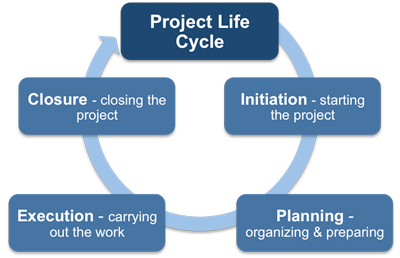
Every project follows the same project life cycle:
- Initiation
- Planning
- Execution(implementing)& Control
- Close Out& handover
1. Conception / identification phase/initiation.
This is the most initial and crucial phase of a project’s life. The idea of a proposing a project is floated and brainstormed widely with a view to supporting or rejecting it. Radical decisions and commitment are made at this phase. It is at this phase where comprehensive feasibility study is carried out to determine project viability. Duties and responsibilities of all members involved in project undertaking are clearly spelt out to avoid conflicts and this division of responsibilities among the project members must be accepted by the respective members.
At the conclusion conception phase, the project purpose and its design pave meters must be documented in clear, simple and accurate terms and agreed upon by all the stakeholders.
In order to achieve good results at conception phase, the following factors must be thoroughly analyzed;
- The ability, capacity and capability of the organization and project management team to undertake the project successfully.
- The total project costs from the scratch to post-conclusion.
- The total budget with the specific breakdowns of project activities to be undertaken.
- The detailed and complete specifications or terms of reference of the project.
- The financial position of the organization or benefactor undertaking the project.
- The knowledge, skills and competence of the project team managing the project.
- The benefits that will accrue from the project if successfully implemented.
- The supply market capability to avail the materials and services required to accomplish the project
- The general acceptability of all the project/contract terms and conditions by all the interested parties to it
- The technologies and best practices to be embraced in implementing the project obligations.
- Commitment by the key stakeholders to comply with legal and regulatory requirements in place.
2. Development phase/planning.
It is at this phase where the project is developed and designed in sufficient details as is necessary to allow it to be created within the limits set at the conception phase. The project manager and his/her team are appointed to implement the Project Plan. Project Management Plan[PMP] may be defined as the statement of works that clearly spell out and in sufficient details on what, why, when, who and how much of the project will be handled subject to future variations as dictated by the prevailing conditions.
The project management team may also incorporate other functional specialists whose input is crucial to the project, if need be.
3. Implantation and control
It is at this phase where project obligations are actualized or transformed into practical reality. An appropriate reporting system on project progress is provided to ensure continuous information sharing for appropriate action taking by the concerned.
The project plan is fully implemented gradually and continually so as to make sure that all the deliverables of the project are fully realized.
The project deliverables need to be measured thoroughly to make sure that each and every project obligation is competently and cost effectively executed.
The resultant findings are also used in making improvements in future projects.
4. Termination or close out or saturation phase.
This is the saturation stage of any undertaken project. An analysis of the project reports is computed out to provide all the valuable information on:
- Success of each method used in project accomplishment.
- Performance level of each project team member.
- Reliability of suppliers and other third party specialist participating in project accomplishments.
- Any huddles that may have been encountered in the process of undertaking the project.
- Possible corrective measures to challenges facing the project implementing.
- Computation of final accounts so as to arrive at the actual total project cost before releasing the final payment to the contractor and discharging the contractor and final batch of project management team.
5. Post evaluation.
Top management in conjunction with the key project team members and any other functional specialists carry out post mortem of the project to make conclusions and recommendations for future projects.
